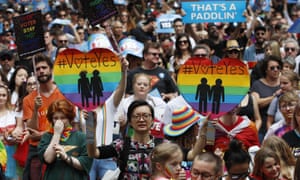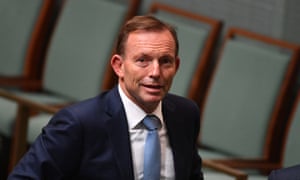Should Australia vote yes for marriage equality, the radical right will launch an unprecedented assault on Australia’s anti-discrimination laws.
Preparations for battle are being made under the cover of the supposed threat marriage equality poses to freedom of religion, free speech and parental rights.
By now every voter has heard the rhetoric: bakers will be jailed for refusing to decorate gay wedding cakes, bishops will be hauled before tribunals simply for defending their definition of marriage, parents will have to accept radical sex education for their children.
To prevent these “unintended consequences” of marriage equality the radical right wants businesses to be allowed to refuse their services to same-sex couples, church hospitals to be able to sack staff who enter same-sex marriages, church schools to be exempt from diversity programs, and, above all, the removal of hate speech laws.
The link the radical right has made between freedom and marriage equality is, of course, the opposite of the truth.
In other countries, marriage equality has benefitted children, strengthened families, and enhanced personal and religious freedoms.
Most people see through the scaremongering, which is why it is unlikely to defeat the yes vote.
But the threat-to-freedom narrative was never meant to win the postal survey.
Its real goal is to stop a yes vote being implemented.
If Australia votes yes, Coalition conservatives will attempt to load down marriage equality legislation with so many exemptions to anti-discrimination legislation that it will be difficult for the Senate to support.
I fear Liberal moderates, including the prime minister, will agree to these exemptions as a small price to pay to get marriage equality off the agenda.
The moderates seem to fundamentally misunderstand that the demands of the radical right – be they for a public vote or for discrimination exemptions – are about slowing down marriage equality, not expediting it.
The other incentive for Liberal strategists to support discrimination exemptions will be to wedge Labor in much the same way the Howard government wedged Labor into supporting its 2004 amendment to the Marriage Act explicitly banning same-sex marriages.
I don’t expect this current wedge to be successful.
Labor has already drawn a line in the sand saying it will support a bill proposed by Senator Dean Smith that has fewer exemptions than the radical right wants.
The LGBTI community has also declared, through a number of large surveys, that it will not suffer more discriminatory laws after struggling so long for full legal equality.
Given all this, a pessimist would predict that marriage equality legislation is destined to fail despite a yes vote, and that the Coalition and Labor will go to the next election loudly accusing each other of being responsible for that defeat.
Is there a way to avoid this and have a yes vote implemented sooner rather than later?
The key is exposing the “freedom” narrative for what it really is, a bid for power and privilege.
Take the idea of religious freedom: Since the Enlightenment it has meant not discriminating against or disadvantaging citizens because of their religion.
But first in the US and now Australia, that meaning has been twisted into its opposite.
“Religious freedom” is now invoked to justify actively discriminating against and disadvantaging LGBTI people in the name of religious values, be it through refusing us services, sacking us from jobs, or speaking about us hatefully.
“Religious freedom” has come to mean giving people of faith legal privileges that other people don’t have.
If contemporary proponents of “religious freedom” were genuine they would want this freedom enshrined in a bill of rights.
Almost to a person they don’t, because the freedom they want is the freedom to impose their values on others.
I believe that when Australians see how privilege is masquerading as freedom they will be much less likely to tolerate it.
The other way to prevent the “freedom” narrative from robbing Australia of marriage equality is to remind the nation why anti-discrimination laws matter.
The point of these laws is to ensure each of us is taken on our merits as an employee, a tenant or a customer, and not unfairly judged because of irrelevant characteristics like race, social origin, religion or sexuality.
Anti-discrimination laws aim to ensure we all have the same opportunities in life regardless of the colour of our skin, the school we went to or who we love.
I can understand why some people think baking a gay wedding cake is a trivial matter, but the next step is a sign in the window saying “No Gays”, and the step after that a sign that says “No Muslims” or “No Blacks”.
Australians will stand up for our anti-discrimination laws when reminded of how these laws promote fairness and the slippery slope that lies ahead when they are weakened.
To defend our anti-discrimination laws from the coming attack we must begin now to explain why these laws matter, and why “religious freedom” is a con.
Only then can we be confident a yes vote will translate into full equality.
- Rodney Croome is a long-time marriage equality advocate and author of “Devil in the Detail: The choice between true marriage equality and new forms of discrimination against LGBTI Australians”.
- Croome will give the Sandy Duncanson Memorial Social Justice Lecture, The Long Road Home: How Marriage Equality will Unlock a Better Future for Australia, at the University of Tasmania in Sandy Bay on Thursday.
- He will also speak alongside David Marr and Branda Appleton on religious exemptions from marriage legislation at a forum, What Happens After Yes, at the Wheeler Centre in Melbourne on 13 November.














 powered by plista
powered by plista
View all comments >
comments (465)
Sign in or create your Guardian account to join the discussion.
"I can understand why some people think baking a gay wedding cake is a trivial matter, but the next step is a sign in the window saying “No Gays”"
That's the difference between refusing to sell certain products and refusing to serve certain demographics. As steps go, it's quite a big one.
Not really. Who is likely to be buying the gay wedding cake?
If this article is accusing the right of fanning paranoia about people being unable to exercise their religious freedoms then the left is equally complicit in fanning paranoia that somehow everyone else to their right is hell bent on taking away every single right they hold dear.
Absolutely, and it's important to keep reminding people that this is what is being sought, that the religious freedom has consequences of those experiencing the sharp end of it. To remind people of what religious freedom looks like when it involves chucking a gay couple out of a hotel or similar.
I've long maintained that this is the area in which rights and freedoms of LGBT people are most under threat as it's the one that many are either far less sympathetic or don't appreciate the potential impact. Succession after succession of court cases in the UK have sought to chip away at that, and there's one about to hit the Supreme Court as well. Even the Guardian have published editorials that indicate a failure to understand this impact.
What I find most objectionable (other than the impact it has) is the hypocrisy of it. Too many religious groups and individuals hold themselves up to be martyrs of a secular society that oppresses them, claiming the protection of the law, when at the same time they're seeking to remove protections for LGBT people in order to oppress them.
Maybe it is time that churches were given the right to pay taxes like the rest of us.
The religious freedom I would prefer, is to be free of religion. Imagine (thank you John Lennon) a world where Christians Jews Muslims Buddhists and their ilk were not continually abusing and murdering each other and arguing about whose 'magic man in the clouds' is the best.
The Age of Reason is well overdue.
Religions are only a pretext for conflict. They are tribal markers. This is why the rules usually only apply to the in-group, whilst the out-group is treated appallingly. Conflict is inevitable because of sexual competition and resource competition, which are not exclusive categories. If we add endogamous mating and polygamy, we have surplus males.
Atheism has no answer to this. Only an equitable mating and social system might help.
Can atheism provide such a system? Without conscience and fear and love of God, why would anyone wish to do the right thing? Enlightened self-interest?
Any ideas?
At it's most basic ... simple reciprocity.
I'll treat you with the same courtesy and consideration that I would expect, and I expect you to reciprocate. At an optimistic level this works for better than 95-97% of people (who are fundamentally good/logical) and only falls over for a small minority (who we expect to be caught by the Law and other social mechanisms we have put in place to trap them).
Firstly, conscience and god are not related.
Secondly, I'd question your humanity if you need to have an imaginary friend watching you in order to do the right thing.
Rodney has hit the nail on the head. The irony is the more religions try to hang on to their power, and the more draconian they get, the more people turn their backs on the church.
Good!
And so it goes.
For Millenia, religions have used their “freedom” to brand LGBTIQ “abomination” resulting in generations of abuse, humiliation and suffering.
Some are positively seething at the thought that many in the Australian community have seen through the historical scapegoating of people who could no more control the form of their sexuality than they could, the colour of their eyes.
They are not likely to accept that change easily. In their minds and according to their scripture, the non-heterosexual are evil.
God “detests” them.
Their irrational belief is not going to be voted away, majority or not.
In the bizarre Christianity story their all knowing god creates his creation to fail, and invents a hell to send billions of people to. No decent person I know would think a christian god worthy, even if it did exist. Which of course it doesn't.
Whats their gods solution? Send itself as a blood sacrifice to itself so it can 'forgive' people for being how it created them in the first place.
Nothing in the history of humanity is more ridiculous than the Christian story.
As a gay kid growing up in Sydney, I internalised all that “sacred” loathing. My sister in law was shocked to first meet me as an out gay 16 year old.
She was disgusted. As an embedded member of the Tamworth Catholic community, she (and her sister) arrived at my home, bibles in hand and condemned me to an everlasting hell.
I’ll never forget her screeching quotes: “Jesus is the WAY and the DOOR!!”
Utterly bizarre. As if I didn’t have enough to deal with.
Needless to say I’m not close to my brother and his new family.
Thanks for sharing.
Most of these people have never really even thought about what they are actually believing in. Just grabbing their fantasy escape from death and running with it, no matter what.
Here you have your sister in law condemning you to eternal punishment ( do they even understand what eternal actually means???) just for being yourself while at the same time patting herself on the back for being a good person. Bizarre indeed.
Thank you Rodney for the huge amount of work you've done on these issues over so many years.
A good test when you see these arguments is always to see them rewritten with black or Jew or (mixed marriage - be it by race or religion ) instead of homosexual and see how it looks. Rodney gave one example but the general process is worth making explicit.
It's also important to point out that where people have gotten into trouble in the US it hasn't been because of their own beliefs but because of the inappropriate way they have tried to foist them on others. For instance the religious exemption for not being forced to marry people against your religion does not and should not extend to a public servant whose job is to issue marriage licences of weddings already legally executed to frustrate the process by refusing to do so. Someone was jailed for a short period in the USA for repeatedly breeching her oath of office. That's not the same thing as religious freedom. If issuing marriage licences so offends her, she still had the freedom to resign. You can't continue to take the money and not do the job. Nor is appropriate to put yourself ahead of the legislature in deciding what the law is.
I mention this because the zealots often misrepresent this case in their arguments and it's worth being forewarned about it.
We also need legislation allowing members of a group to sue for slander /libel when their group is unfairly slandered or misrepresented. E. G. The scientifically false claim that children do poorer in gay parent families. We allow this for corporations we can allow it for groups.
A play for power and privilege is one way of phrasing it, or you could just say bigotry. But we mustn't offend the delicate sensibilities of the "No" crowd with nasty words.
Let's try again, shall we?
Is that a fight the religious really want to pick? They may find their numerous protections and privileges removed in the process.
In the eyes of the religious right freedom, like tolerance, is something to be preserved for the privileged , the self-important, and the blinkered.
Although not clearly stated in this article, Rodney has stated elsewhere that the religious freedom argument comes from the radical right in the Liberal party, the religious arm of the IPA also known as the Aust. Christian Lobby, and other groups who oppose homosexuality in general.
By and large the religious freedom argument does not come from the offical religious groups in Australia. While the christian churches in Australia are slow at accepting gay people in its ordained ministry it has, by and large, for years had a 'live and let live' attitude towards members of the congregations who may be gay. The social welfare arms of the churches has been on the forefront of providing inclusive care for all, regardless of sexual orientation.
Most hetrosexual people of faith are offended that RWNJ's are hijacking religion for their own homophobic agenda.
Thanks for that clarification, we shouldn't confuse reasonable people with the Australian Christian Lobby and IPA.
It seems to me that, absent of right wing posturing, you could come up with a reasonable set of guidelines. You can choose what you sell, but you can't discriminate who you sell it to. If you are a religious organization with non-religious businesses such as hospitals or real estate, you can't discriminate against staff or customers on the grounds of their sexuality. A secular wedding clerk can't refuse to process a gay wedding, but a religious organization can refuse just as some currently refuse to marry divorced people or non-religious people.
Exactly. You actually don’t need any more rules, we already have them in the state and federal anti-discrimination acts. The exemptions in those give religious organisations all the protections they need and gay marriage should not change things one iota, for people who are not LGBTI.
Agreed. Why do we need new legislation, anyway, Can't the current Marriage Act be amended to read "marriage is a union between two persons..." with person defined as a natural person to overcome the definition given in the Acts Interpretation Act?
Congratulations RWNJ's that are the Australian government; we're an international bemusement on the subject of marriage equality.
The clue is in the title, EQUALITY.
Or are we going to continue to discriminate against those that seek this equality? It was only 50 years ago, or less, that the law makers segregated 'people of colour' from the white people. Being told, lawfully, to sit in another part of the bus. Same deal with the 'Yes' vote. This is a human rights issue, for EQUALITY, and for the RWNJ' s to continue to debass this debate is typical of their despicable position.
And it was people like Lyle Shelton and Peter Dutton who fought tooth and nail to keep those lunch-counters and drinking-fountains segregated.
... the next moves of this appalling Turnbull “government” on SSM ...
... will indicate if Turnbull and his gang actually represent the people ...
... or if they will go to any lengths to block and frustrate the public will ...
... either way, the absurd delays dictate that Turnbull Must Go!
What is wrong with Australia now? Or perhaps the better question is what did I miss all these years? On my visits there, and with friends, I used to think that you were just ordinary civilised people, just with a different accent. That was evidently very wrong. But of course the poll will prove that I was right all along.
And as soon as it happens, a couple of gay soap stars will marry each other, and look very handsome, and very happy, and all the papers will say “Don’t they look lovely?”. And the whole issue will die, for ever. Just like in the UK, or France, or anywhere else.
If marriage equality becomes law, there are still issues.
One example is the writing of the legislation to even "protect" florists and bakers for having the right to refuse services to same sex marriage couples.
Australia is run by religious zealots.
I tend to forget that Australia is a long way away, and is only civilised to the extent it chooses to be. Back in the UK (and in France, where I live) we signed up to the European Convention on Human Rights many decades ago. It stops us being too naughty, but over time it has also made this sort of cake-decoration-discrimination nonsense, if not unthinkable, at least commercial suicide.
Australia is supposedly a 'secular' country, it's hard to reconcile this with the apparent power that religious lobby groups and assorted god botherers have over our politicians. Even though poll after poll shows voters are in favour of SSM, Voluntary Euthanasia and Abortion many pollies seem to be in favour of allowing these pressure groups to run the show. A minority's ideological and religious prejudices shouldn't be able to dictate how the majority of population chooses to live or die.
They are organised and political these religious types, I've got a niece going to a public school telling me about the true God for Christ's sake, talk about messing kids up.
I agree 100%. Well said, fredgladys.
School Chaplaincy programme that taxpayers are paying for has a number of interesting requirements including;
"It is a Commonwealth requirement that funding is only available for school chaplains – secular student welfare workers are not eligible for Programme funding."
If the goal of the programme is to help students improve their emotional well being why are fully trained secular professionals not allowed to be part of the programme.
https://education.nsw.gov.au/student-wellbeing/whole-school-approach/wellbeing-support/nscp
On the Turnbull government could take legislation about equality to a place of prejudice and punitive provelidge.
No, an Abbott one could too....
In the end, when everything's taken into account, 1000 times and again, every detail and discussion point has been dissected in kilometres of column space and years worth of Q
Hey, half my post has disappeared! Here's the other half:
Q
Sorry, it seems to have disappeared again. Nothing like the 'net when it works as expected.
acl What can I say. They seem to be more of a Hate group rather than a Christian group.
Oh the irony of it all. Hate is the devil’s playground and the acl are happily at play.
They can try pulling this shit if they want to be wiped out completely at the next election + plus laws can always be changed so it will have all been for nothing.
Never underestimate the staying power of bad legislation. While it's true laws can always be changed, it can nonetheless take an unconscionably long time.
Exhibit A: Howard's insidious tweaking of the Marriage Act, which got us into this position in the first place.
Hmmm this is Michael Sukkar carrying on about this....I think he is in a marginal seat.
Good luck with GetUp come election time Michael!
If these politicians had even half a brain ......
3.2%. It's another seat where, much like Dickson which is held by Obergruppenführer Dutton, you wonder how the demographic was ever hoodwinked into voting for an ultra-conservative Abbott apparatchik. Still, 3.2 is totally doable. Here's hoping.
It's a walk in the park - just remember all those 'young people' the govt got to sign onto the electoral roll for the SSM survey thingy : )
It's the Y2K bug all over again. Non event. Nothing is going to fall out of the sky.
Yes!
* winning *
Sucks to be a homophobe.
Oh Malaise you are going to have so much fun.
More fun than a barrel of monkey pods!
He’ll have fun fun fun till the people take his big chair away! ; )
Religious freedom is Freedom of Worship. The right to worship the god/s of your choice where and how you choose provided no one else is harmed or laws are broken. Like Freedom of Speech it is not absolute. You cannot choose to worship with your congregation in the middle of a busy freeway at 5pm on a Wednesday.
Now we have these hitherto unknown religious rights to sack your cleaner or choose your customers based on their sexuality or same sex marriage status.
The much more fundamental freedom is my right to be treated equally before the law, regardless of my gender, race, sexuality or religion. Interestingly while I can not discriminate against you on the basis of your religion you want the right to discriminate against me on the basis of your religion.
Very well put.
That's it. That is the sentence that NOW needs to be repeated everywhere. Perfectly exemplifies the hypocrisy of the "freedom" argument.
Nice, have an up vote.
Great article yes the delay tactic is a primary objective these people using religion, read a book other than snippets of the bible for Darwins sake.
Sign in or create your Guardian account to recommend a comment